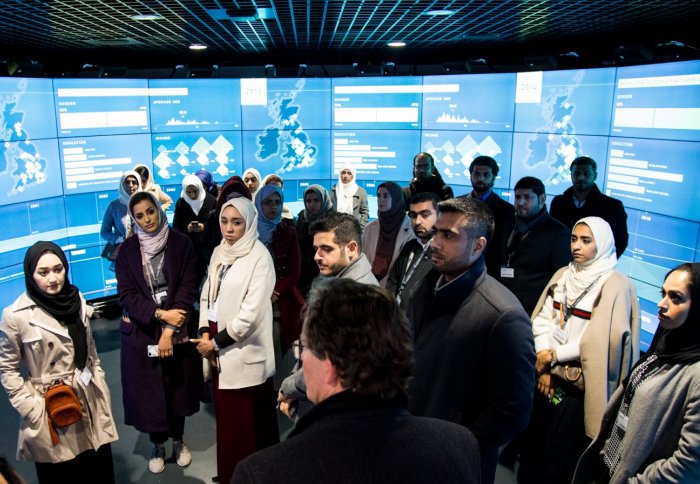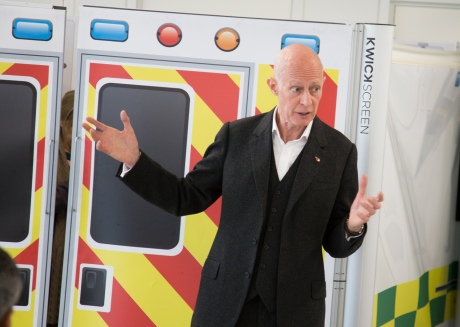UAE officials travel to Imperial to take part in innovation diploma

More than 50 UAE government officials travelled to Imperial to undertake a module of an executive education diploma focussing on innovation.
The year-long programme has been developed by Imperial’s Executive Education team for the Mohammed Bin Rashid Centre for Government Innovation. It is intended to help UAE government officials come up with better ways to improve the country’s public-sector policy, processes, systems and services, working towards its goal of becoming the most innovative nation in the world as part of its Vision 2021 strategy.
To encourage participants to become more innovative, the week-long module (the third of six) featured a series of workshops across Imperial’s South Kensington and White City campuses, drawing on the College’s multidisciplinary strengths in business and STEM subjects.
Highlights included a workshop showing a simulation of a patient’s journey through the UK healthcare system – from their own home, to the general ward via an ambulance, to the operating theatre.
While the patient was played by an actor, the medical roles were undertaken by medical professionals across the College and its healthcare network, acting out their daily reality.
The course was led by Professor Roger Kneebone, Director of the Imperial College Centre for Engagement and Simulation Science.

Professor Roger Kneebone talks through a simulation of a patient's journey
Professor Kneebone said: “The value of looking at the whole path is that it’s a view, which unless we’re a patient, we don’t normally see. It’s a way of bringing into view the whole system. We can see what happens or what doesn’t happen, where information could get misinterpreted. The value of simulation is that it makes things visible.”
After watching the workshop, participants were encouraged to suggest improvements and draw parallels with their own work environments.
“I learnt from the simulation that we often take the customer’s point of view for granted. You have to be there, to be the customer. What I am going to take from this is to sympathise with the customer more, to be there with them from beginning to end to have a clear vision of their journey, and of their problems,” reflected Hayat Al Hammadi, one of the delegates.
Drama, design and disruption
The medical simulation was not the only example of innovation in delivery over the two days of the course. Participants also took part in a workshop lead by Richard Olivier, of Olivier Mythodrama – a consultancy that employs the lessons of myth and drama to train and develop leaders. They used Shakespeare’s history play Henry V to explore leadership in differing contexts (the play centres on the English king’s victory over France at the Battle of Agincourt in 1415).
Outside of the workshops, participants also heard talks about innovation from speakers including Liam Maxwell, the UK’s first national technology advisor, Shazam co-founder Dhiraj Mukherjee, and Blenheim Chalcot co-founder Charles Mindenhall, in conversation with Professor David Gann CBE, Imperial’s Vice-President of Innovation and Professor Peter Childs, Head of the Dyson School of Design Engineering.
Professor Nelson Phillips, Abu Dhabi Chamber Chair in Innovation and Strategy at Imperial College Business School, led a session on user-led innovation.
There was also a session on design thinking given by Clare Brass, Director of Department 22 - a consultancy focused on design thinking, entrepreneurship and sustainability.
In the short term we hope participants recognise new ways to identify solutions and resources for their group innovation projects.
– Guy Gumbrell
Co-Director, Executive Education
The programme closed with a session from Business School Dean Professor Francisco Veloso on innovation through digital disruption – looking at how new market players can change how business is done in any given industry.
Guy Gumbrell, Co-director of Executive Education and Director of the programme, said: “There are many possible short and longer term benefits to this module. In the short term we hope participants recognise new ways to identify solutions and resources for their group innovation projects. In the longer term, we believe they will be able draw on the experiences of this week to have greater impact as innovation leaders – both with regard to identifying and isolating problems at individual, process and systems levels and in understanding themselves better as developing change leaders.”
The programme runs for a year in total, with topics covered including ‘megatrends’, foresighting, idea generation, collaboration, leading change and ‘intrapreneurship’ (entrepreneurship within an organisation) in the public sector. The final module will see candidates pitching projects in a Dragons’ Den-style competition, followed by a graduation ceremony and dinner in May 2018.
Article text (excluding photos or graphics) © Imperial College London.
Photos and graphics subject to third party copyright used with permission or © Imperial College London.
Reporter
Laura Singleton
Communications Division